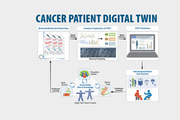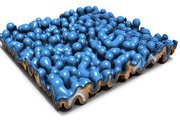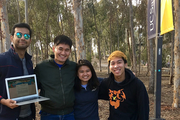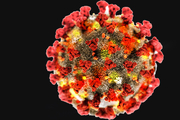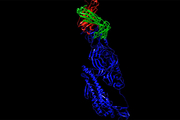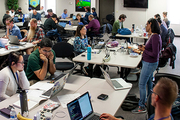Did you know we have a monthly newsletter? View past volumes and subscribe.
COVID-19 R&D: Computing responds to pandemic
Jan. 19, 2022 -
When the COVID-19 pandemic began, the Laboratory immediately started seeking solutions to the myriad challenges posed by the global crisis. The Computing Directorate jumped right in with research and development activities that combine molecular screening to inform antiviral drug experimentation; a generative molecular design software platform to optimize properties of antiviral drugs; an...
Digital twins for cancer patients could be ‘paradigm shift’ for predictive oncology
Dec. 16, 2021 -
A multi-institutional team, including an LLNL contributor, has proposed a framework for digital twin models of cancer patients that researchers say would create a “paradigm shift” for predictive oncology. Published online Nature Medicine on November 25, the proposed framework for Cancer Patient Digital Twins (CPDTs) — virtual representations of cancer patients using real-time data — would...
Lab-led effort one of nine DOE-funded data reduction projects
Sept. 17, 2021 -
An LLNL-led effort in data compression was one of nine projects recently funded by the DOE for research aimed at shrinking the amount of data needed to advance scientific discovery. Under the project—ComPRESS: Compression and Progressive Retrieval for Exascale Simulations and Sensors—LLNL scientists will seek better understanding of data-compression errors, develop models to increase trust in...
Visualization software stands the test of time
Sept. 13, 2021 -
In the decades since LLNL’s founding, the technology used in pursuit of the Laboratory’s national security mission has changed over time. For example, studying scientific phenomena and predicting their behaviors require increasingly robust, high-resolution simulations. These crucial tasks compound the demands on high-performance computing hardware and software, which must continually be...
60 years of cancer research
Sept. 10, 2021 -
From studying radioactive isotope effects to better understanding cancer metastasis, the Laboratory’s relationship with cancer research endures some 60 years after it began, with historical precedent underpinning exciting new research areas. In one Cancer Moonshot project, research includes a close synergy between experiments and computation, allowing scientists to get a better picture of the...
COVID-19 detection and analysis with Nisha Mulakken (VIDEO)
June 7, 2021 -
LLNL biostatistician Nisha Mulakken has enhanced the Lawrence Livermore Microbial Detection Array (LLMDA) system with detection capability for all variants of SARS-CoV-2. The technology detects a broad range of organisms—viruses, bacteria, archaea, protozoa, and fungi—and has demonstrated novel species identification for human health, animal health, biodefense, and environmental sampling...
Laser-driven ion acceleration with deep learning
May 25, 2021 -
While advances in machine learning over the past decade have made significant impacts in applications such as image classification, natural language processing and pattern recognition, scientific endeavors have only just begun to leverage this technology. This is most notable in processing large quantities of data from experiments. Research conducted at LLNL is the first to apply neural...
The data-driven future of extreme physics
May 19, 2021 -
By applying modern machine learning and data science methods to “extreme” plasma physics, researchers can gain insight into our universe and find clues about creating a limitless amount of energy. In a recent perspective published in Nature, LLNL scientists and international collaborators outline key challenges and future directions in using machine learning and other data-driven techniques...
Advanced Data Analytics for Proliferation Detection shares technical advances during two-day meeting
May 7, 2021 -
The Advanced Data Analytics for Proliferation Detection (ADAPD) program held a two-day virtual technical exchange meeting recently. The goal of the meeting was to highlight the science-based and data-driven analysis work conducted by ADAPD to advance the state-of-the-art to accelerate artificial intelligence (AI) innovation and develop AI-enabled systems to enhance the United States’...
Virtual seminar series explores data-driven physical simulations
April 6, 2021 -
The rapidly growing fields of artificial intelligence (AI) and machine learning (ML) have become cornerstones of LLNL’s data science research activities. The Lab’s scientific community regularly publishes advancements in both AI/ML applications and theory, contributing to international discourse on the possibilities of these compelling technologies.
The large volume of AI/ML scientific...
DOE announces five new energy projects at LLNL
Nov. 13, 2020 -
The DOE today announced two rounds of awards for the High Performance Computing for Energy Innovation Program HPC4EI), including five projects at LLNL. HPC4EI connects industry with the computational resources and expertise of the DOE national laboratories to solve challenges in manufacturing, accelerate discovery and adoption of new materials and improve energy efficiency. The awards were...
From intern to mentor, Nisha Mulakken builds a career in bioinformatics
Nov. 3, 2020 -
The COVID-19 pandemic has sparked a wave of new research and development at the Lab, and Nisha Mulakken is very busy. The biostatistician has enhanced the Lawrence Livermore Microbial Detection Array (LLMDA) system with detection capability for all variants of SARS-CoV-2. The technology detects a broad range of organisms—viruses, bacteria, archaea, protozoa, and fungi—and has demonstrated...
Advancing healthcare with data science (VIDEO)
Aug. 3, 2020 -
This video provides an overview of projects in which data scientists work with domain scientists to address major challenges in healthcare. To help fight the COVID-19 pandemic, researchers are developing computer models to search for potential antibody and antiviral drug treatments, sharing a data portal with scientists and the general public, and analyzing drug compounds via a novel text...
COVID-19 research goes public through new portal
May 18, 2020 -
A new online data portal is making available to the public a wealth of data LLNL scientists have gathered from their ongoing COVID-19 molecular design projects, particularly the computer-based “virtual” screening of small molecules and designed antibodies for interactions with the SARS-CoV-2 virus for drug design purposes. The portal houses a wealth of data LLNL scientists have gathered from...
New partnership results in increased access to compelling 'real world data'
April 21, 2020 -
Through a new partnership between the UC San Diego Library, Halıcıoğlu Data Science Institute (HDSI), and LLNL's Data Science Institute, UCSD library patrons can now access and analyze two new “real world” data sets from LLNL. The Open Data Initiative collection shares some of LLNL’s challenging and unique data sets, which range in complexity from large-scale, domain-specific simulated data...
Using data to build a secure future (PODCAST)
April 21, 2020 -
On the Hidden in Plain Sight podcast, LLNL director Bill Goldstein explains how the Lab crunches data to shape the future. Listen at Mission.org.
LLNL creates web resources to aid in fight against COVID-19
March 30, 2020 -
LLNL is fully committed to helping protect the U.S. from COVID-19 and to speed the recovery of those affected. As a world-class research institute, we have considerable infrastructure, unique research capabilities and a dedicated team of scientists and engineers supporting the fight against the COVID-19 pandemic. Our current COVID-19 research and response activities are focused on four broad...
Lab antibody, anti-viral research aids COVID-19 response
March 26, 2020 -
LLNL scientists are contributing to the global fight against COVID-19 by combining artificial intelligence/machine learning, bioinformatics and supercomputing to help discover candidates for new antibodies and pharmaceutical drugs to combat the disease. Armed with the virus’ predicted 3D structure and a few antibodies known to bind and neutralize SARS, an LLNL team led by Daniel Faissol and...
DSI sponsors LLNL hackathon
Feb. 18, 2020 -
Since 2012, Lawrence Livermore National Laboratory’s (LLNL’s) Computing directorate has held hackathons three times a year. These spring, summer, and fall events are scheduled over 24 hours and invite software teams to work on new ideas, programming languages, open-source tools, or project tasks. Exploration and experimentation are highly encouraged, and “It’s OK to fail” is the event mantra...
Deep learning may provide solution for efficient charging, driving of autonomous electric vehicles
Feb. 4, 2020 -
LLNL computer scientists and software engineers have developed a deep learning-based strategy to maximize electric vehicle (EV) ride-sharing services while reducing carbon emissions and the impact to the electrical grid, emphasizing autonomous EVs capable of offering 24-hour service. Read more at LLNL News.


